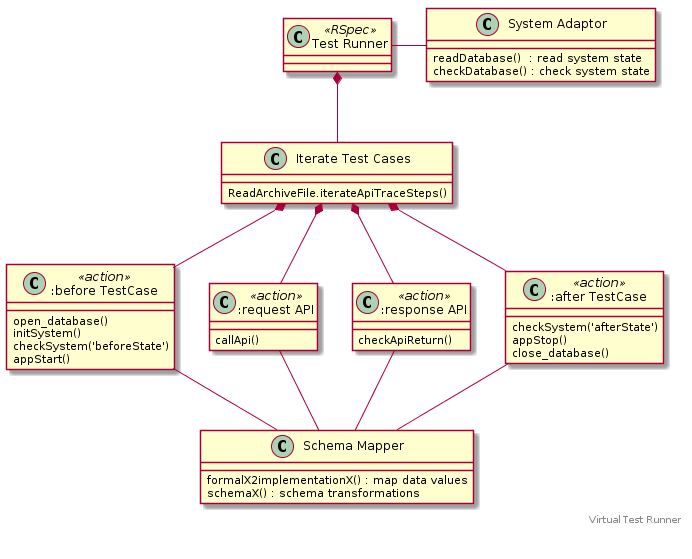Virtual System Testing
1 Implement Virtual System Test Runner
1.1 Test Runner Components
1.2 Test Runner Overview

1.3 Test Runner Components
1.3.1 RSpec Framework
Test runner uses RSpec framework with tests wrapped with in
describe block starting with
require_relative "../spec_helper" describe "virtual-system-tests" do
and ending with
end # virtual system tests
1.3.2 Iterate Test Cases
1.3.2.1 Test Case Input Directory and Interface to Test
Define directrory, where to read API Trace steps, and the the
interface to test:
fixtureDir = VIRTUAL_SYSTEM_TEST_INPUT_DIRECTORY interface = "TimeoffRegisterCompany"
1.3.2.2 Iterate Test Case iterateApiTraceSteps
API ReadArchiveFile.iterateApiTraceSteps in tla-trace-arch GEM
iterates API trace steps using a Ruby block starting with
Sbuilder::TlaTraceArch::ReadArchiveFile.iterateApiTraceSteps( fixtureDir, interface ) do |sha1, apiTraceStep| # String identifying test case step testDescription = "Step #{apiTraceStep["00-step"]["step"]} - interface #{apiTraceStep["00-step"]["interface"]} SHA1=#{apiTraceStep["00-step"]["sha1"]}"
and ending with
end # iterateTestCases
1.3.3 Map from Formal Model to Implementation
1.3.3.1 Map Data Values from Formal Model to Implementation
Lambda functions to transform data values from formal model data space to implementation data space:
TODO: mapping should use formal model domain information
# Map 'formalEmail' to 'implementationEmail' formalEmail2implementationEmail = ->(formalEmail) do # add domain '@test.com' to make formal model # email to valid email in implementation "#{formalEmail || "noemail"}@test.com" end # Map 'formalLastName' to 'implementationLastName' formalLastName2implementationLastName = ->(formalLastName) do # just prefix "lastt-#{formalLastName}" end
1.3.3.2 Map Schema from Formal Model to Implementation
Schema transformations use hashformer GEM, a Ruby Hash-based DSL, for transforming data from formal model space to implementation space
# Schema transform formal model entity 'User' schemaUser = { "name" => HF["user_name"], "lastname" => HF["user_name"].__as{ |x| formalLastName2implementationLastName[x] }, "email" => HF["user_email"].__as{ |x| formalEmail2implementationEmail[x] }, } # Schema transform formal model entity 'Company' schemaCompany = { "name" => HF["company_name"], } # Schema transform formal model 'beforeState' & 'afterState' schemaModelState = { Users: HF[:Timeoff_Users].to_a.map{ |u| HF.transform( u, schemaUser) }, Companies: HF[:Timeoff_Companies].to_a.map{ |u| HF.transform( u, schemaCompany) }, } # schemaModelState # Schema transform formal model 'apiInput' schemaApiInput = { "name" => HF["user_name"], "lastname" => HF["user_name"].__as{ |x| formalLastName2implementationLastName[x] }, "email" => HF["user_email"].__as{ |x| formalEmail2implementationEmail[x] }, } # Schema transform formal 'apiResponse' schemaStatus = { "success" => HF["status"].__as{ |stat| stat == "status_200" }, }
1.3.4 Action :before TestCase
support_test_progress "------------------------------------------------------------------" support_test_progress "#{testDescription}" # Db open_database( dbFile ) # Init system delete_table( "Users") delete_table( "Sessions") delete_table( "Companies") # check systems support_test_progress " Check beforeState" checkDatabase( asIs: readDatabase, toBe: map_transform( comment: "beforeState>", data: apiTraceStep["01-inp"], xSchema: schemaModelState ) ) # app support_test_progress " Start application" appStart
1.3.5 Action :request Api
support_test_progress " Make API call" # navigate to regitration form ui_navigate_main_page ui_choose_register # fill registration ui_register_form_fill( map_transform( comment: "api_input", data: apiTraceStep["02-api"], xSchema: schemaApiInput)) # submit registation = API call ui_register_form_submig
1.3.6 Action :response API
# Check return status from API support_test_progress " Check API response" if ( map_transform( comment: "api_return", data: apiTraceStep["03-ret"], xSchema: schemaStatus )["success"] ) then support_test_progress " Check API response - expect success" expect( page ).to have_content( "Registration is complete.") else support_test_progress " Check API response - expect failure" end
1.3.7 Action :after TestCase
# Shutdown server support_test_progress " Stop application" appStop # run checks before closing database support_test_progress " Check afterState" checkDatabase( asIs: readDatabase, toBe: map_transform( comment: "afterStateToBe>", data: apiTraceStep["04-out"], xSchema: schemaModelState )) # close_database
1.3.8 System Adaptors
1.3.8.1 Read system state readDatabase
def readDatabase { Users: select_from_table( "Users", getTableSchema( "Users")), Companies: select_from_table( "Companies", getTableSchema( "Companies")), } end
1.3.8.2 Check system state checkDatabase
# Expect 'asIs' to include 'toBe' def checkDatabase( asIs:, toBe: ) chk_db_table_included( comment: "db-Users>", toBe: toBe[:Users], asIs: asIs[:Users], keyLambda: ->(r1,r2) { r1["email"] == r2["email"] } ) chk_db_table_included( comment: "db-Companies>", toBe: toBe[:Companies], asIs: asIs[:Companies], keyLambda: ->(r1,r2) { r1["name"] == r2["name"] } ) end
1.4 Test Runner Implementation
For the implementation refer to code in GitHub repo.